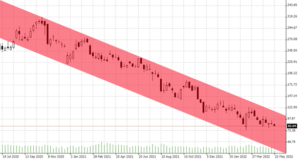

26.05.2022 – How the images resemble each other: The regime in Beijing is enforcing a rigorous zero-covid policy. Including lockdowns, traffic jams at the ports and disruption of the supply chains. Now just like at the beginning of the pandemic. With severe consequences for the economy and the stock market. We explain what this means for traders and investors.
China stocks have not been a source of joy for the bulls lately. Since the beginning of the year, China’s mainland index CSI 300 has slipped by about one fifth. For months, the Chinese leadership has been teaching the domestic oligarchs a lesson, putting more and more obstacles in their way. And then Corona, too. Pars pro toto, the share of the trading platform Alibaba shows the decline of all those shares that rely primarily on the domestic market. The famously bearish trend in the weekly chart speaks for itself.

Source: Bernstein Bank GmbH
The latest bad news from the Middle Kingdom: The number of illnesses in Beijing has risen and the nearby port city of Tianjin sealed off a district in the centre. In the past days and weeks, some bad economic data had arrived from China: The Corona variant Omicron is taking its toll on the Chinese economy.
Data of horror
Industrial production fell 2.9 per cent in April compared to a year earlier, the Beijing statistics bureau reported. Retail sales plunged by a staggering 11.1 per cent – exceeding most analysts’ forecasts. A particular problem for the communist party: unemployment in China is rising sharply – the unemployment rate was 6.1 percent in April. This figure is only just below the historical record of 6.2 per cent from February 2020 from the beginning of the Corona pandemic. A particular problem: youth unemployment is currently even higher than it was then. The CP lives in constant fear of an upheaval.
Moreover, there is the threat of a loss of face: the Chinese leadership had set a growth target of 5.5 percent for this year. The International Monetary Fund expects only 4.4 percent. In April, real estate sales were the weakest in 16 years – the real estate crisis is spreading. Beijing has therefore lowered interest rates on mortgage loans for first-time buyers.
Hopes for a turnaround
The hopes of the financial market are now pinned on an opening of the port of Shanghai. According to the government, the metropolis of millions should gradually return to normality by 1 June. In Beijing, however, the lockdown remains in place in some districts. To contain the spread, the government had imposed an extremely restrictive lockdown in Shanghai and other major cities since the end of March. Millions of people in Changchun or Jilin province have not been allowed to leave their homes for weeks. In the capital Beijing itself, many neighbourhoods are sealed off. Most shops and many companies are closed. Millions work in their home offices.
Waiting for the interest rate cut
And with all this misery, long-orientated investors are now hoping for a turnaround. Presumably, the Chinese central bank will cut interest rates in the course of the year to stimulate the economy. Unlike in the West, there are good fundamental reasons for this, as inflation is only 2.1 percent. We suspect that at some point the stock market will start to believe in the Chinese future again – and then the now beleaguered stocks will probably make a particularly strong recovery. Bernstein Bank is keeping an eye on the matter for you – we wish you successful trades and investments!
Important Notes on This Publication:
The content of this publication is for general information purposes only. In this context, it is neither an individual investment recommendation or advice nor an offer to purchase or sell securities or other financial products. The content in question and all the information contained therein do not in any way replace individual investor- or investment-oriented advice. No reliable forecast or indication for the future is possible with respect to any presentation or information on the present or past performance of the relevant underlying assets. All information and data presented in this publication are based on reliable sources. However, Bernstein Bank does not guarantee that the information and data contained in this publication is up-to-date, correct and complete. Securities traded on the financial markets are subject to price fluctuations. A contract for difference (CFD) is also a financial instrument with leverage effect. Against this backdrop, CFD trading involves a high risk up to the point of total loss and may not be suitable for all investors. Therefore, make sure that you have fully understood all the correlating risks. If necessary, ask for independent advice. CFDs are complex instruments and are associated with the high risk of losing money quickly because of the leverage effect. 68% of retail investor accounts lose money trading CFD with this provider. You should consider whether you understand how CFD work and whether you can afford to take the high risk of losing your money.7
